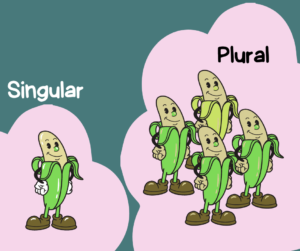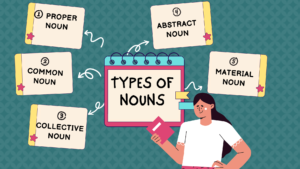Countable Nouns
Nouns that represent things or entities that can be counted are called countable nouns. Examples include persons, pen, pencils, etc. These nouns can be grouped into plurals or singulars.
What are Plural Nouns and Singular Nouns?
Singular nouns are those nouns which denote a single person, place, or thing. For example, boy, girl, tree, city, brush, teacher, etc.
Plural nouns are those which denote more than one person, place, or thing. For example, boys, girls, trees, cities, brushes, teachers, etc.

Rules of Forming Plurals
In english only two numbers exists-singular and plural. Every singular noun has its plural form that may or may not be alike. There are some rules to form plurals from singular nouns. These are as follows:
Rule 1: Plural nouns can be formed by adding -s to their singular form.
| Singular | Plural |
| Boy | Boys |
| Cow | Cows |
| Pencil | Pencils |
| Bag | Bags |
Rule 2: Plurals of the nouns ending with -x, -s, -sh, or-ch are formed by adding -es to their singular forms.
| Singular | Plural |
| Box | Boxes |
| Bus | Buses |
| Branch | Branches |
| Brush | Brushes |
Rule 3: Plurals of nouns that end in -o are formed are mostly formed by adding -es to their singular forms. However, some plurals are formed by adding -s.
| Singular | Plural |
| Potato | Potatoes |
| Mango | Mangoes |
| Photo | Photos |
| Logo | Logos |
Rule 4: Plurals of nouns that end in -y preceded by a consonant are formed by replacing -y with -ies.
| Singular | Plural |
| City | Cities |
| Deity | Deities |
| Franky | Frankies |
| Army | Armies |
Rule 5: Plurals of nouns that end in -f or -fe are formed by replacing -f or -fe with -ves.
| Singular | Plural |
| Half | Halves |
| Knife | Knives |
| Life | Lives |
| Calf | Calves |
Exception: Some nouns ending with -f or -fe can be converted into plural by adding -s.
| Singular | Plural |
| Chief | Chiefs |
| Safe | Safes |
| Cliff | Cliffs |
| Proof | Proofs |
Rule 6: Plurals of some noun are formed by changing an internal vowel.
| Singular | Plural |
| Man | Men |
| Woman | Women |
| Tooth | Teeth |
| Mouse | Mice |
Rule 7: Some plurals are exactly same as their singular forms. For example, dozen, score, sheep,gross, etc.
Rule 8: Some plurals are formed by adding -en to their singular forms.
| Singular | Plural |
| Ox | Oxen |
| Child | Children |
Rule9: Some nouns that are taken from a different language have a completely unique or original plural forms. They aren’t derived.
| Singular | Plural |
| Radius | Radii |
| Bacterium | Bacteria |
| Memorandum | Memorandum |
| Axis | Axes |
Rule 10: Compound nouns are formed into plurals by adding -s to the principal word.
| Singular | Plural |
| Son-in-law | Sons-in-law |
| Commander-in-chief | Commanders-in chief |
| Step-daughter | Step-daughters |
| Passer by | Passers by |
Some Interesting Facts About Singular and Plural Nouns
- Some nouns are always used in plural. For example, bellows, tongs, scissors, spectacles, pincers, trousers, jeans, drawers, etc.
- Some nouns are now used as plurals are actually singular. For example, alms, riches, etc.
- Some nouns look plural but they are singular. For example, mathematics, physics, news, rickets, mumps, billiards, etc.
- Some nouns are are used as singular but always represent more than one. For example, money, wealth, etc.
- Some collective nouns are always used as plurals. For example, poultry, cattle,people, etc.
- Some nouns has two different plural forms with different meaning. For example, Brother has two plural forms, brothers and brethren. Brothers is used when one denotes sons of same parents. Brethren denotes members of same group, society, or nation.
- Some nouns have different meanings in singular and plural form. For example, advice means counsel wherein advices means information.
- Some uncountables can become countable when formed into plurals. For example kindness is an abstract noun and cannot be counted but when we write kindnesses, we mean to say acts of kindness. Similarly when we say tin we mean a single metal but when we say tins it means boxes or cans made up of tin.
Frequently Asked Questions
1.What is the plural form of fish, sheep, scissors?
Ans: Plurals of fish-fishes/fish, sheep-sheep, scissor-scissors.
2.‘Bouquet’ should use is or are as helping verb?
Ans: A bouquet of flowers denotes a single collection of flowers. It will be hence treated as a unit and will be followed by singular verb.


